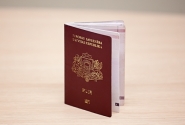
On Thursday, 9 May, the Saeima in the final reading adopted amendments to the Citizenship Law that recognise dual citizenship, set forth the procedure for granting citizenship to children born in Latvia to non-citizens and to children born abroad to Latvian citizens, as well as introduce changes in the naturalisation procedure.
The amendments to the Citizenship Law were drafted by a special subcommittee of the Legal Affairs Committee. This major reform of the Citizenship Law was implemented for almost two years in close cooperation with experts and was aimed at developing a Law that would fit the current situation and solve the problems accumulated over the years.
Until now the citizenship issue in Latvia was regulated by the Law that was last amended in 1998; it not only failed to reflect society’s values and today’s situation but also ignored Latvia’s membership in the European Union and current migration processes.
The Citizenship Law is supplemented with the statement of its purpose, namely, five areas covered by the Law. The Law determines the persons who are considered Latvian citizens, grants titular nationals – ethnic Latvians and Livs – the right to register as Latvian citizens, as well as enables Latvians in exile and their descendants to register as Latvian citizens. The purpose of the Law is also to promote the development of a cohesive Latvian society based on shared values of the Latvian people, as well as to recognise dual citizenship according to the political goals and interests of Latvia and to preserve the community of Latvian citizens under conditions of increased mobility.
By recognising dual citizenship, the Law enables citizens of Latvia who have acquired the citizenship of another member state of the European Union, European Free Trade Association or North Atlantic Treaty Organisation to retain Latvian citizenship. Dual citizenship will also be an option for Latvian citizens who have acquired the citizenship of a state that has signed an agreement with Latvia on recognition of dual citizenship. The amendments also permit dual citizenship with Australia, Brazil and New Zealand.
The new wording of the Law sets forth that persons who have acquired the citizenship of a state not mentioned above will be able to retain Latvian citizenship upon permission issued by the Cabinet of Ministers. Those who have acquired the citizenship of another state through marriage or adoption will also able to retain Latvian citizenship.
With regard to ethnic Latvians and Livs, it will be possible to grant citizenship to those who can prove that their ancestors used to live in the territory of Latvia and that they speak the Latvian language.
Latvian citizenship is made available for Latvians in exile and their descendants upon submission of relevant proof. This applies to citizens who left Latvia because of the occupation regime of the USSR or Germany or were deported and by 4 May 1990 had not returned to Latvia for permanent residence.
The amended Law also sets forth that a child is a Latvian citizen regardless of his/her place of birth if at the moment of the child’s birth one of the parents is a Latvian citizen. Children born in Latvia to Latvian non-citizens after 21 August 1991 will be recognised as citizens if they permanently reside in Latvia and have always been stateless persons or non-citizens. A child of a non-citizen will be recognised as a citizen upon registration of the newborn and expression of such a desire by a parent.
The amendments also more accurately specify revocation and restoration of Latvian citizenship, renunciation of the citizenship, and the naturalisation procedure. For example, a simplified test will be administered to persons who have received primary education in the Latvian language with more than a half of the curriculum taught in the Latvian language or who have acquired full curriculum of general secondary or vocational secondary education.
The amendments to the Citizenship Law will come into force on 1 October 2013, concurrently with the relevant Cabinet regulations.









